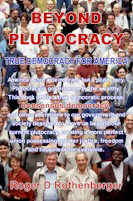|
Maybe you were pleased with the results of the recent election, or maybe you're like A. Tad Bitter of Clearwater, Maine and your preferred presidential candidate was your pet lobster Marvin. Regardless, we who care about the environment and about democracy have a fundamental problem to face up to: Our system of governance isn't working very well.
Many of us in the US pursue issues that are important to us—whatever they may be. But while we are passionately pursuing these interests, politicians and their plutocratic godfathers have been busy rigging the game.
 Their occasional attempts at campaign-finance reform or changes in ethics rules are all window dressing—the system has been slowly altered to benefit those in power and to exclude any significant participation on the part of those NOT in power. We may dutifully vote on election day, but it's only as part of the fixed game being run by the country's two major political parties.
Their occasional attempts at campaign-finance reform or changes in ethics rules are all window dressing—the system has been slowly altered to benefit those in power and to exclude any significant participation on the part of those NOT in power. We may dutifully vote on election day, but it's only as part of the fixed game being run by the country's two major political parties.
Fortunately, there has been no talk in the Grinning Planet offices of grabbing pitchforks and torches and marching on town. But we do get the feeling that Business as Usual is simply running out of road, for environmentalists and for most other groups with a cause, whether they be liberal, conservative, or lobsterish. Today's guest columnist, Roger D. Rothenberger, author of the book "Beyond Plutocracy—True Democracy for America," discusses how we might effect change so that all of us can have a real voice within our government.
~ ~ ~
How to Fix What's Really Wrong With the
American Government – by Roger D. Rothenberger
AMERICA IS NOT REALLY A DEMOCRACY
Most of America's many political, economic, and social ills are caused or aggravated by its most fundamental problem: America is not a democracy. America is a plutocracy—it is governed by the wealthy.
 Its government is populated by and best serves the wealthy, who have held a hegemony of power through the generations, much to the detriment of the rest of the populace. Elections, offices, and the favors of government are bought just like any other commodity.
Its government is populated by and best serves the wealthy, who have held a hegemony of power through the generations, much to the detriment of the rest of the populace. Elections, offices, and the favors of government are bought just like any other commodity.
While the two major political parties embrace some differing secondary issues that attract each of us to one over the other, they both embrace and do not attempt to alter the current plutocracy. That is because they are empowered by it or are part of it. Therefore, the fundamental injustices and the many social, economic, and environmental problems caused by the plutocracy are never adequately repaired.
Superficial reform and eternal tinkering will never fix the problem. The issue is not which party controls the government; the problem lies in its design, its structure, and the distribution of its powers.
AMERICA HAS ALWAYS BEEN A PLUTOCRACY
Our current plutocracy is not simply the result of irresponsible wealthy corporations and individuals corrupting our once-sacred democracy over recent decades. The creators of America's constitution and government were among the wealthy aristocrats of their day. When they created their new government, the founders excluded democracy to the extent politically possible at the time. They embraced instead the republican form of government, so-called "representative democracy." We citizens vote for candidates, elect them, and bequeath to them the power to make decisions for us. The citizenry does not have the power to make decisions of national governance directly, as it would in a true democracy.
The great failure of representative democracy is that our supposed representatives do not fairly represent the entire populace. They represent themselves and their wealthy clients first and best. One might say that the republican form of government always degenerates into plutocracy, but more realistically, it starts out as plutocracy and never rises above it.
The most insidious characteristic of representative government is that it appears to be a democracy as it quietly goes about its business of excluding democracy. We citizens dutifully vote and believe the myth that we have a democracy, albeit a strangely unresponsive one that repeatedly fails to work for us. Thus, unrecognized for what it is by most people, the continued existence of the American plutocracy is ensured.
THE FEW VS. THE MANY
There has been a rapid increase in the concentration of power and wealth at the top in recent decades at the same time we've seen the economic decline or stagnation of all others. The wealthy who occupy high office and the private-sector plutocrats who pull the strings of government from behind the scenes are well coordinated and mutually supportive in a way that ensures the continuance of their positions.
 The "excluded many" are fragmented into thousands of political camps, each with their righteous but often narrow interests—minority rights, women's rights, gun rights, a living wage, abortion, corporate honesty, morality in the media, environmental protection, and so on. The divided many struggle with each other as Republicans vs. Democrats, Left vs. Right, conservatives vs. liberals, capitalists vs. socialists, "good" people vs. "bad" people. They ineffectually beg an unhearing government to address their needs and interests; but within a system of governance that is physically, mentally and spiritually poisonous to the furtherance of the good of the many, the efforts rarely bear fruit.
The "excluded many" are fragmented into thousands of political camps, each with their righteous but often narrow interests—minority rights, women's rights, gun rights, a living wage, abortion, corporate honesty, morality in the media, environmental protection, and so on. The divided many struggle with each other as Republicans vs. Democrats, Left vs. Right, conservatives vs. liberals, capitalists vs. socialists, "good" people vs. "bad" people. They ineffectually beg an unhearing government to address their needs and interests; but within a system of governance that is physically, mentally and spiritually poisonous to the furtherance of the good of the many, the efforts rarely bear fruit.
CHANGE—GETTING BEYOND THE FEAR FACTOR
The solution—the only possible solution as I see it—is to partially redesign the American government. That may sound like a very radical and probably scary proposition. Even though we've occasionally tweaked the constitution via amendments, the core design of the US government remains unchanged since the founding, and most people unquestioningly believe in the wisdom of the Founding Fathers.
But remember that Thomas Jefferson wrote in the Declaration of Independence that it is our right and duty to throw off despotism. We now suffer the despotism of plutocracy. Individual freedoms, fairness in labor standards and trade, the ability to achieve true democracy, the right to pursue truly free enterprise (i.e. enterprise that not under the aegis of government-favored corporate giants)—all of these things are under assault from the plutocratic elite. It is our right and duty to win true democracy, honest representation, and just governance for our nation and the generations to come.
Significant change is usually characterized by the plutocrats as extremism and radicalism. In truth, our current plutocracy is radical, and the elite's relentless fight to ever increase its power, wealth, and privilege is extreme. Using the corporate media they own and the government offices they occupy or control, the plutocrats have succeeded in convincing many people that any change in our current system is a move toward socialism or communism. That's the "red scare" tactic. But the changes I propose have nothing to do with socialism or communism, nor are they radical or extreme when put in historical context. They merely introduce a judicious measure of true democracy and fair representation into our government to facilitate improvements in individual freedom, economic rights, personal responsibility, and good citizenship.
FIXING WHAT'S WRONG
Now, back to how we fix our broken government. What I propose is not a revolution or a wholesale scrapping of our system, but rather a next step. The design of government has improved throughout human history. The design of America's republic was one such improvement compared to other governmental systems of the time. But over the last two hundred years, our government's design has shown that it has serious flaws. Fortunately, these flaws can be repaired.
The corrective measure that I propose is to create a new branch of government. For now, let's call it the "demos," which is Greek for
| |
CONCENSUS DEMOCRACY
AND ITS ADVANTAGES |
|
• The demos would consist of the entire electorate participating in a truly democratic process. In this consensus democracy, people would deliberate and vote directly on a permanent, limited set of twelve of our most important political-economic issues.
• In consensus democracy's greatly simplified tax system, the entire electorate—rather than the wealthy few—would determine the size and distribution of the tax burden that we set upon ourselves.
• Despite the addition of a new fourth branch (the demos), consensus democracy would reduce the overall size of government and increases its efficiency.
• Consensus democracy would lead to a better-managed market economy.
• It would increase the responsiveness of government to the will of all of us rather than to just the will of the few.
• It would increase personal and public power as well as the freedom of everyone.
• It would bring greater justice, morality and legitimacy to governance.
|
"the people." The demos would comprise the entire electorate, enabling us to practice true democracy. The demos would be set in a judicious balance with somewhat modified legislative and executive branches, with the judicial branch being left unchanged. The profound imbalance of power currently favoring the wealthy few would be corrected by empowering the entire electorate. This new truly democratic design of our government would be called "consensus democracy."
In the new consensus democracy, some constitutional powers would be reassigned or revised. For instance, the power to tax and three other economic powers would be removed from the other branches and moved into the demos. The demos would also contain a new way to elect the president, senators and representatives. For more details on consensus democracy, please see the sidebar.
COULD IT REALLY WORK? HOW DO WE START?
Today, the majority of people are excluded in practical terms from participating in or deriving maximum benefit from our government. The only way they will ever gain any significant measure of power and win a better world is to pull together as a unified political power.
The singular goal of the excluded many must be to win meaningful inclusion in government. This does not mean that everyone should suddenly stop pursuing narrower efforts such as protecting the environment, reforming media, or helping the poor. Everyone should simply add "winning inclusion" to whatever they are currently doing.
The most practical place to build this new unified political power—a true democracy movement—is on the internet at a single location. At this location, we can build the framework of the consensus democracy, including the demos, and finalize the myriad details that go along with such a major reform.
 I have created a starting point for this effort—a web site called Beyond Plutocracy. The core of the web site is a free book by the same name, in which I further justify the need for this major change and lay out my vision of how consensus democracy might work. There is also a discussion group to facilitate the exchange of ideas.
I have created a starting point for this effort—a web site called Beyond Plutocracy. The core of the web site is a free book by the same name, in which I further justify the need for this major change and lay out my vision of how consensus democracy might work. There is also a discussion group to facilitate the exchange of ideas.
We must work with persistent unity and dedication to first make the demos a political power to be reckoned with and, in due time, shepherd the constitutional change that will officially establish it as the fourth branch of our government.
Once the entire electorate is empowered both by direct participation within the demos and by finally being able to elect truly representative officials to the legislative and executive branches of government, we will all be able to deliberate on an equal footing within government about our other, narrower interests. Only then will America finally have gone beyond plutocracy and become at long last a true democracy.
Thank you for reading this article. Please share this article and the free book Beyond Plutocracy with others.
More articles and resources on....
Get Grinning Planet free via email
|


